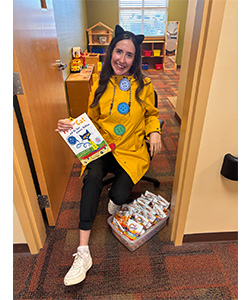Andrea Acker, a graduate student in social work, wants to use play therapy in her career when she graduates from Wichita State University. At Rainbows United, she gets hands-on experience using this therapeutic modality.
Play therapy allows children to express themselves and process hard emotions using toys while being guided by mental health professionals. This form of intervention has proved effective in treating a number of psychological afflictions including those stemming from developmental trauma.
 Courtesy photo
Courtesy photo“Kids don’t fully develop language communication until they’re 11, and for kids younger than that, play is the way they communicate and toys are their words,” Acker said. “Toys that resemble real-life things are a way for them to process things in their life through play. Play is really powerful.”
One of Acker’s roles as a practicum student for the mental health team at Rainbows United is to conduct play therapy. On a regular day at her job, Acker will begin with a therapy session with a child. She will plan two or three activities and let the child choose which one they want to do. Sometimes the child will choose to play, in which case Acker will begin a session of child-led play. The child will take initiative on their play and Acker will track what they are doing and mirror their emotions, being careful not to steer the session.
Acker got her first master’s degree in elementary education and spent seven years as a kindergarten teacher at Lincoln Elementary School in Hutchinson before she decided she wanted a degree that offered a greater breadth of opportunities.That’s when she enrolled in the Master’s in Social Work program at Wichita State, and got a practicum on the Rainbows United mental health team for credit hours in her program, and a stipend.
Rainbows United specializes in helping children with special needs and their families by connecting them to resources and providing services such as family support, mental health support, and childcare. Rainbows United has various daycare locations serving mostly 3 to 5 year olds, including Kids’ Point, where Acker works. Kids’ Point, one of Wichita’s TOP Learning Centers, uses a developmentally appropriate curriculum focusing on social, motor, emotional and intellectual skills as well as kindergarten readiness.
“My role is mainly working with clients that teachers and parents have referred,” Acker said. “ I work with a therapist to make intervention plans or individualized support plans to provide individualized services for those kids. I also work at the TOP daycare sites and in the community where families can reach out for services, and I shadow therapists who go into homes and therapists at TOP daycare sites.”
The content Acker learns at Wichita State helps her to navigate her job at Rainbows United by making her more aware of systemic issues and childhood trauma. Understanding trauma has helped Acker to meet children where they’re at developmentally rather than basing her expectations of them on their age or grade in school.
“The Neurosequential Model is the school of thought that says you have to address neurological developments as they develop,” Acker said. “ You can’t expect a child who had trauma as an infant to be doing math as a third grader if their lower levels of brain development haven’t been addressed.”
According to Acker, this is why intervening early in a child’s life is so important.
“Being a positive adult in a kid’s life, and having unconditional positive regard for a kid is helping them build resilience,” Acker said.
In her first three months of working at Rainbows, Acker built skills including learning how to read assessments and support plans, and how to create and curate interventions for therapeutic services that follow the child’s specific plan.
“I think it’s helped me develop my philosophy of working with children,” Acker said. “I think it’s always been to model grace and give children tools and skills to be successful in what they want to be and do in life, but it’s pivoted a little bit from being a teacher to being in mental health. Part of it is just thinking about, are these skills I’m providing– am I providing them because they serve the child, or because a system is telling me to? I try to make sure I am being in service to a child, not to a system.”
Acker appreciates how her job at Rainbows United allows her to learn these skills in a hands-on manner.
“Before I did this I taught kindergarten, so hands-on learning is all kindergarteners do all day every day,” Acker said. “That's how I learn best too, so that’s why I gravitated toward kindergarten and Rainbows. Being in the room with the kid and trying out the interventions that I’ve curated is a lot different from reading a book about interventions for a kid. It’s kind of like action research where you get real-time feedback.”
At Rainbows United, not only does Acker get hands-on experience doing her dream job of play therapy, but all the work she does directly contributes to research. Parents first sign a consent form for their child and all collected information is anonymized. Then all the Rainbows kids’ skills data is gathered and goes to Wichita State for research on child and adolescent development. Results are then curated and presented. Acker recently attended one of these presentations.
“It was so cool to see,” Acker said. “I was there representing Rainbows but also as a Wichita State student. It was cool.”
Overall, Acker’s favorite part of her job at Rainbows United is making a difference in kids’ lives.
“I feel really privileged that Rainbows entrusts me to work with kids and do therapeutic services with them,” Acker said. “Getting to impact a kid’s life and giving them tools that will hopefully help them be more successful in what they want to do in life is really rewarding.”

